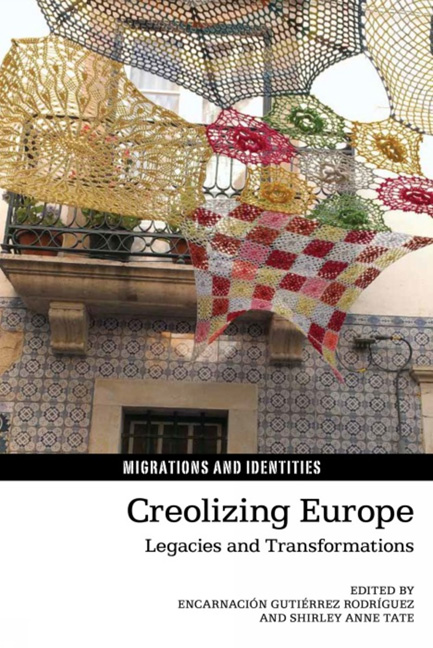Book contents
- Frontmatter
- Dedication
- Acknowledgements
- Contents
- List of Figures
- List of Contributors
- Introduction: Creolizing Europe: Legacies and Transformations
- 1 Creolité and the Process of Creolization
- 2 World Systems and the Creole, Rethought
- 3 Creolization and Resistance
- 4 Continental Creolization: French Exclusion through a Glissantian Prism
- 5 Archipelago Europe: On Creolizing Conviviality
- 6 Are We All Creoles? ‘Sable-Saffron’ Venus, Rachel Christie and Aesthetic Creolization
- 7 Re-imagining Manchester as a Queer and Haptic Brown Atlantic Space
- 8 Queering Diaspora Space, Creolizing Counter-Publics: On British South Asian Gay and Bisexual Men's Negotiations of Sexuality, Intimacy and Marriage
- 9 On Being Portuguese: Luso-tropicalism, Migrations and the Politics of Citizenship
- 10 Comics, Dolls and the Disavowal of Racism: Learning from Mexican Mestizaje
- 11 Creolizing Citizenship? Migrant Women from Turkey as Subjects of Agency
- Index
3 - Creolization and Resistance
- Frontmatter
- Dedication
- Acknowledgements
- Contents
- List of Figures
- List of Contributors
- Introduction: Creolizing Europe: Legacies and Transformations
- 1 Creolité and the Process of Creolization
- 2 World Systems and the Creole, Rethought
- 3 Creolization and Resistance
- 4 Continental Creolization: French Exclusion through a Glissantian Prism
- 5 Archipelago Europe: On Creolizing Conviviality
- 6 Are We All Creoles? ‘Sable-Saffron’ Venus, Rachel Christie and Aesthetic Creolization
- 7 Re-imagining Manchester as a Queer and Haptic Brown Atlantic Space
- 8 Queering Diaspora Space, Creolizing Counter-Publics: On British South Asian Gay and Bisexual Men's Negotiations of Sexuality, Intimacy and Marriage
- 9 On Being Portuguese: Luso-tropicalism, Migrations and the Politics of Citizenship
- 10 Comics, Dolls and the Disavowal of Racism: Learning from Mexican Mestizaje
- 11 Creolizing Citizenship? Migrant Women from Turkey as Subjects of Agency
- Index
Summary
L'esclave de l'esclavage est celui qui ne veut pas savoir.
Édouard Glissant, Le Discours Antillais (1981), p. 129.Opacities can coexist, converge, weaving kinds of fabric whose true meaning would be related to the interweaving of this weft and not to the nature of its component threads.
Édouard Glissant, Poétique de la Relation (1990).At the 2007 conference ‘Creolizing Europe’ at the University of Manchester, I worked through the notion of creolization to discuss the project I was then working on, the Maison des civilisations et de l'unité réunionnaise (MCUR), a museum that was scheduled to open in Reunion Island. Rewriting this contribution, with the distance that a series of events has produced, I approach the question differently. Indeed, in the meantime, there was an important crisis in the French overseas departments and the museum project I had worked on was brutally stopped. In December 2008 and January 2009, there were strikes throughout the French ‘outre-mer.’ The most important one happened in Guadeloupe under the leadership of a new public figure, Elie Domota, who was able to articulate the society's long discontent and to mobilize practically the entire population with the movement, Liyannaj Kont Pwofitasyon (LKP), an alliance of unions, associations, artists, and intellectuals. The strikes constituted the greatest mobilization since the 1970s and many intellectuals participated in the debates. History did not seem to stammer, it looked as if there was hope. Ideas developed by anticolonial thinkers and activists in the French post-colonies, by Aimé Césaire, Frantz Fanon and Édouard Glissant on economic exploitation, alienation and postcoloniality were reinterpreted in the light of social, cultural and economic mutations although the territories were still caught in the web of dependencies on France and the continuous absence of real power of decision, the impotence of local politicians, the lack of justice, the rate of youth unemployment. The États généraux de l'outre-mer (EGOM) – a large consultation initiated by the French government – and local political contradictions impeded the momentum of a new postcolonial political movement, one that sought to imagine what kind of relationship could be possible between postcolonial territories and the French Republic.
- Type
- Chapter
- Information
- Creolizing EuropeLegacies and Transformations, pp. 38 - 56Publisher: Liverpool University PressPrint publication year: 2015

